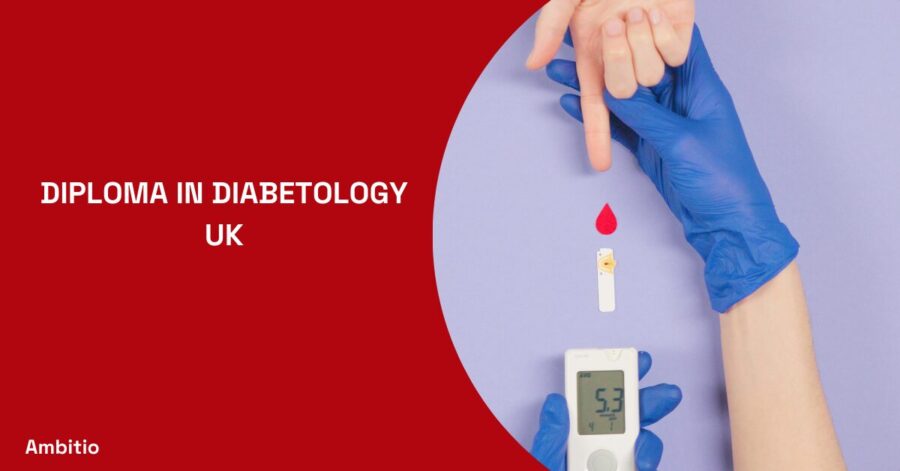14 December 2024
7 minutes read
Embarking on a Diploma in Diabetology in the UK

Diabetes is a global health challenge that requires a specialized approach to care and management. In the UK, the pursuit of a postgraduate diploma in diabetology represents a commitment to this cause.
This blog post will delve into the essence of the Diploma in Diabetology in the UK, discussing the intricacies and benefits of this valuable postgraduate program. We will explore the course details, requirements, and potential career pathways, and answer frequently asked questions about this esteemed qualification.
Understanding the Diploma in Diabetology
The Need for Specialized Diabetes Education
In the face of rising diabetes prevalence, there is a critical demand for healthcare professionals who are not only knowledgeable but also equipped with the most up-to-date practices in diabetes care. The UK’s Diploma in Diabetology is crafted to meet this need by providing postgraduate-level education that is both comprehensive and accessible.
What the Diploma Entails
The Diploma in Diabetology is a rigorous program that offers in-depth knowledge about the various aspects of diabetes. It covers the pathophysiology, diagnosis, and management of the disease, as well as the latest in clinical research and treatment approaches. Participants of this program study the intricacies of both Type 1 and Type 2 diabetes, giving them a holistic understanding of the condition.
The International Appeal of a UK Diploma in Diabetology
Recognition Across Borders
The UK’s postgraduate diplomas in diabetology are recognized globally, making them an excellent choice for international healthcare professionals looking to enhance their credentials and potentially practice in the UK or other countries.
Catering to a Global Audience
The international dimension of these courses means that the curriculum is designed with a global perspective in mind. Students can benefit from the diverse experiences and viewpoints of their international peers, further enriching their learning experience.
The Online Postgraduate Diploma in Diabetes Experience
Flexibility and Accessibility
One of the significant advantages of the online postgraduate diploma is the flexibility it offers. Healthcare professionals can continue their education without compromising their work responsibilities. The course modules are designed to be completed remotely, making use of interactive tools and online resources.
Interactive Learning and Support
Distance learning doesn’t mean learning in isolation. The online platform is structured to facilitate interaction with peers and tutors. Discussion forums, webinars, and real-time feedback are integral components of the course, ensuring that students have a supportive and engaging educational experience.
Entry Requirements: Who Can Apply?
Academic and Professional Prerequisites
To embark on a journey toward a Diploma in Diabetology in the UK, candidates must fulfill certain academic and professional prerequisites. Primarily, this program is targeted at healthcare professionals who have previously completed a degree in a relevant field such as medicine, nursing, or life sciences. This foundational knowledge is crucial as it ensures that all participants start with a solid understanding of basic medical concepts.
Relevant Professional Qualification
A professional qualification is typically mandatory. For instance, medical doctors should have completed their MBBS or equivalent degree, while nurses should have their RN certification.
These qualifications are indicative of the candidate’s ability to comprehend complex medical terminologies and concepts, which will be extensively covered in the diploma program.
Clinical Experience
Most institutions also require candidates to have some level of clinical experience. This experience allows candidates to relate the course content to real-world scenarios and understand the practical implications of their studies.
Whether it’s working in a hospital, a clinic, or a community healthcare setting, hands-on experience with patients, particularly those with diabetes, can be immensely beneficial.
Continuous Professional Development
For healthcare professionals, continuous professional development (CPD) is a lifelong process. Applicants for the Diploma in Diabetology should ideally show an ongoing commitment to CPD, evidenced by participation in workshops, seminars, and other relevant training programs related to diabetes care and management.
Language Proficiency and Other Considerations
The medium of instruction for the Diploma in Diabetology is English, and thus, a high level of proficiency in the language is essential. This is not only to ensure that participants can fully engage with the course content but also to facilitate effective communication with tutors and peers.
English Language Proficiency
For non-native English speakers, a common requirement is an International English Language Testing System (IELTS) score that meets the university’s entry criteria. The required score may vary between institutions, but generally, a score of 7.0 or above is seen as demonstrating an adequate level of English for postgraduate study.
IT Skills and Equipment
In the case of online diploma courses, candidates must have a good level of IT literacy, as they will need to navigate various learning platforms and digital tools. Additionally, they should have access to a reliable computer and internet connection to participate in webinars, access course materials, and complete assessments.
Recognition of Prior Learning
Many programs also consider the recognition of prior learning (RPL). This means that if a candidate has already undertaken relevant postgraduate studies or has extensive professional experience in a related field, they may be eligible for credit or may even be able to bypass certain entry requirements.
Special Cases
In special circumstances, candidates who do not meet the standard entry requirements may still be considered on an individual basis. This is particularly true for candidates who can demonstrate significant professional experience in the field of diabetology or a related discipline.
Commitment to the Profession
Lastly, the ideal candidates are those who demonstrate a strong commitment to the profession. They should exhibit a passion for improving the health and well-being of patients with diabetes and a desire to stay at the forefront of advances in diabetes care. This dedication is often reflected in a candidate’s personal statement or letter of intent, which may be required as part of the application process.
Curriculum and Learning Outcomes
A Deep Dive into Diabetes
The curriculum is designed to cover all bases of diabetes care. This includes detailed modules on the latest diagnostic methods, management strategies, and an overview of the psychological impact of diabetes on patients. The learning outcomes are geared towards producing graduates who are capable of leading diabetes care teams and initiatives.
From Theory to Practice
An emphasis on real-world application is a hallmark of this diploma. Theoretical knowledge is complemented by case studies, clinical scenarios, and practical tasks. This approach ensures that graduates can apply their learning directly to their clinical practice, improving outcomes for people with diabetes.
Career Advancements and Opportunities
Opening Doors in Healthcare
A diploma in diabetology can be a game-changer for healthcare professionals. It opens up opportunities for advancement in both primary and secondary care settings, and many graduates find themselves in roles where they can significantly influence diabetes care protocols and policies.
Becoming a Leader in Diabetes Care
The diploma not only increases knowledge but also enhances leadership skills. Graduates are well-positioned to take on roles such as diabetes specialist nurse, consultant, or educator. They become the experts that others turn to for guidance in diabetes care.
Financial Considerations: Fees and Funding
Understanding the Financial Investment
The decision to pursue a Diploma in Diabetology in the UK is accompanied by the consideration of various financial obligations. Tuition fees for postgraduate diplomas can vary significantly depending on the institution and the length of the program. Prospective students should conduct thorough research on the costs associated with their chosen course to budget appropriately.
Tuition Fees
The core expense is the tuition fee, which typically includes access to the university’s resources, registration, examination fees, and sometimes, the cost of certain study materials. Tuition fees may also vary based on residency status, with international students often paying a higher rate than domestic students.
Additional Costs
In addition to tuition, there may be supplementary costs. These can include but are not limited to, textbooks, specialist equipment, and for some programs, travel and accommodation expenses for any required on-campus sessions or exams. For online courses, while travel costs may be minimal, there may still be expenses related to internet access, software subscriptions, or home office equipment.
Funding Options and Scholarships
Recognizing the financial challenge that further education can pose, many institutions offer a range of scholarships and bursaries to support students. These can be merit-based, need-based, or subject-specific and can significantly reduce the financial burden.
University Scholarships
Many universities provide scholarships that are available to both domestic and international students. These can be competitive and often require the applicant to demonstrate academic excellence, professional accomplishments, or financial need.
External Funding
External funding sources, such as educational trusts, charities, and professional bodies, may also offer scholarships or grants. Healthcare professionals are encouraged to investigate these options early, as application deadlines can be far in advance of the course start date.
Employer Sponsorship
For those already working in the healthcare field, employer sponsorship is another potential source of funding. Some employers are willing to invest in their staff’s education, especially if the diploma can directly benefit the organization.
This might be full or partial sponsorship, and usually, comes with certain conditions, such as remaining with the employer for a set period after completing the course.
Payment Plans and Loans
For students who may not secure grants or scholarships, payment plans can offer a viable alternative. Many universities provide the option to pay tuition fees in installments, easing the immediate financial pressure.
Student Loans
In some cases, postgraduate loans are available from government bodies. These loans are designed to cover tuition fees and living costs and are repaid on an income-contingent basis after graduation. The terms of these loans, including repayment thresholds and interest rates, should be carefully reviewed before any commitment is made.
Cost-Benefit Analysis and Long-Term Value
It’s essential for prospective students to conduct a cost-benefit analysis. While the upfront cost of a diploma might seem high, the long-term benefits—such as career advancement, higher earning potential, and personal development—often outweigh the initial investment.
Return on Investment
The diploma in diabetology can lead to career advancement opportunities that may result in higher salaries and more prestigious positions. It also provides healthcare professionals with the expertise to potentially open their own practice or consultancy in diabetes care, offering a substantial return on investment over time.
Making Informed Financial Decisions
Finally, prospective students should be proactive in seeking financial advice from the institution’s admissions or financial aid office. They can provide detailed information on fees, available scholarships, and any other potential funding opportunities.
Conclusion
The Diploma in Diabetology in the UK is a cornerstone in the field of diabetes education and management. It equips healthcare professionals with the tools necessary for providing top-tier care and positions them as leaders in a field that is becoming increasingly important in today’s health landscape.
With the comprehensive curriculum, flexible learning options, and career advancement opportunities it provides, this diploma is a valuable asset for any healthcare professional looking to make a significant impact in the lives of people with diabetes.
FAQs on Diploma in Diabetology in the UK
Who should consider a Diploma in Diabetology?
Healthcare professionals who wish to specialize in diabetes care, include doctors, nurses, and allied health workers.
Can I work full-time while studying for the diploma?
Yes, the flexible, online nature of the course allows for part-time study alongside full-time work.
What career paths are available after completing the diploma?
Graduates can progress to specialist roles in diabetes care, research, and education, or continue their studies towards an MSc in Diabetes or related fields.
How is the diploma assessed?
Assessment methods include assignments, case study analyses, and exams, depending on the specific modules and institution.
Are international students eligible for the diploma?
Yes, the diploma welcomes international applicants and provides support for those for whom English is not their first language.

You can study at top universities worldwide!
Get expert tips and tricks to get into top universities with a free expert session.
Book Your Free 30-Minute Session Now! Book a call now




























